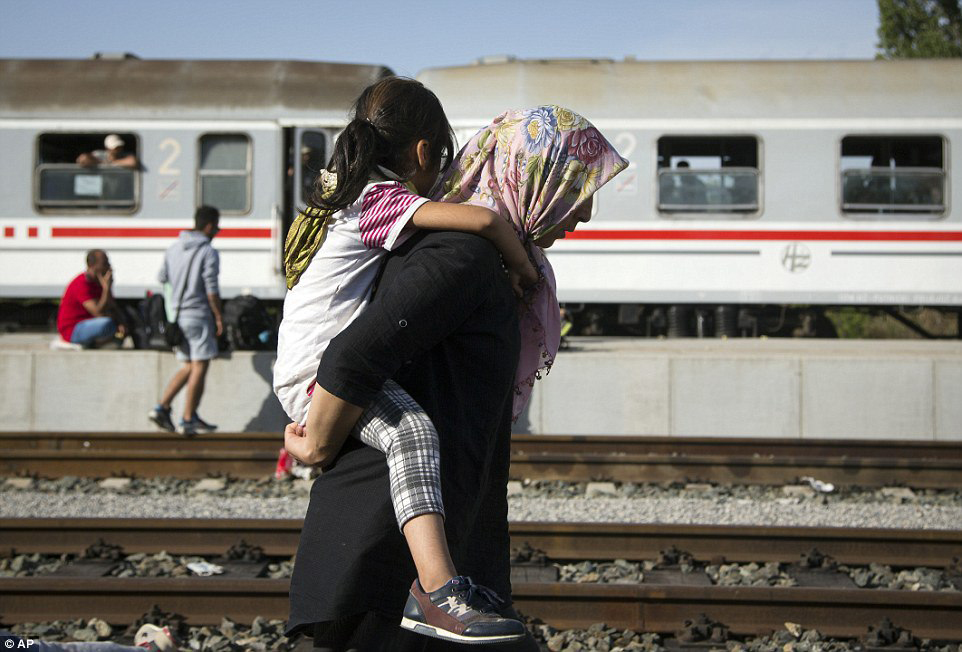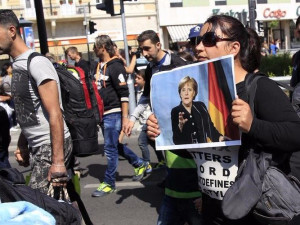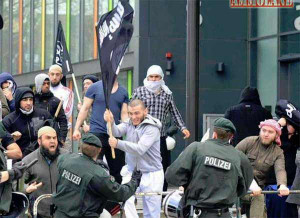 In September, Dayton Mayor Nan Whaley was one of 17 mayors of cities who wrote to President Obama to encourage raising the number of refugees that the United States plans to take in. Whaley’s actions spurred criticism from Republican Congressman and former Dayton Mayor Mike Turner.
In September, Dayton Mayor Nan Whaley was one of 17 mayors of cities who wrote to President Obama to encourage raising the number of refugees that the United States plans to take in. Whaley’s actions spurred criticism from Republican Congressman and former Dayton Mayor Mike Turner.
“Something like this should not be handled so cavalierly and unilaterally by the mayor of Dayton,” Turner said. “I don’t think she understands what she is undertaking. I don’t think she understands what she is committing the community to and she ought to focus her job back on the city and leave the Syrian refugees to the administration.” In his own letter, Turner wrote that Whaley “does not speak for [the Dayton] community.”
“Our role, as a city, as a community, as the mayor, is to make sure we welcome these folks with open arms,” Whaley said. Whaley believes that being an open and diverse community is what will make Dayton successful.
Turner’s letter reads similarly to one he penned earlier, during the Border Crisis in 2014. Turner cites the costs of expenditures like increased police force, education and healthcare before again stressing, “In addition, Mayor Whaley does not have the authority to make such an offer for the city of Dayton.”
Whaley pledged her support to Cities United for Immigration Action, pledging that “As a municipal leader and a member of Cities United for Immigration Action, I stand with my peers from across the country in support of stronger, safer and more economically prosperous cities and counties through immigration action.”
Welcome Dayton is an initiative that was adopted in 2013. It comprises a series of key growth and development goals aimed to make Dayton immigrant-friendly. There has been debate on if Dayton qualifies as a “sanctuary city” with the conditions that the reforms of Welcome Dayton created. “Sanctuary cities” are those that have policies designed to not prosecute illegal immigrants.
Executive Order No. 12, 2008 Physical Arrests of Traffic Violators, put in place by Dayton Police Chief Richard S. Biehl, modified protocol so as to prohibit officers from verifying immigration status of crime witnesses, victims and those perpetrators of minor traffic violations or other low-level offenses—one of the many qualifiers of “sanctuary city” policies.
 Topics like illegal immigration and conflict in Syria have been some of the hot-button political issues at the forefront of newsrooms internationally. Recently, Germany, a European country that had already planned to accommodate 800,000, released a report doubling their estimate. Bild newspaper reports that the government document reads, “This high number of asylum seekers runs the risk of becoming an extreme burden for the states and municipalities.”
Topics like illegal immigration and conflict in Syria have been some of the hot-button political issues at the forefront of newsrooms internationally. Recently, Germany, a European country that had already planned to accommodate 800,000, released a report doubling their estimate. Bild newspaper reports that the government document reads, “This high number of asylum seekers runs the risk of becoming an extreme burden for the states and municipalities.”
Germany released estimates over the next few years projecting eight million in extended immigration, including the influx of family members of refugees over the original displacement.
Angela Merkel, Chancellor of Germany, closed the nation’s borders on Sunday, September 13 leaving thousands of refugees in the neighboring Austria. The Refugee Crisis has taken many forms across the European Union and further abroad.
Merkel, along with Francois Hollande President of France, addressed the issue of the “broken” asylum system in the European Union, where refugees are required to seek asylum in the first country they enter. Merkel suggests “a new procedure” that would distribute the refugees “fairly” amongst the 28 member of the European Union.
Criticism on the refugee crisis and migration arises from a variety of perspectives. Home secretary of the United Kingdom, Theresa May, detailed struggles the United Kingdom faces with the diversity among asylum seekers and other migrants on cultural, economic, and humanitarian grounds.
May delivered a speech on Tuesday October 6 during the Conservative Party conference. Mays said, “people on both extremes of the debate—from the anti-immigration far right to the open-borders liberal left—conflate refugees in desperate need of help with economic migrants who simply want to live in a more prosperous society.”
“Their desire for a better life is perfectly understandable, but their circumstances are not nearly the same as those of the people fleeing their homelands in fear of their lives,” said May. May also expressed concerns that “when immigration is too high, when the pace of change [in the country] is too fast, it’s impossible to build a cohesive society.”
“Now I know there are some people who say, yes there are costs of immigration, but the answer is to manage the consequences, not reduce the numbers. But not all of the consequences can be managed, and doing so for many of them comes at a high price,” Mays said.
Concerns of religious regard were expressed by many including Josef Schuster, president of the Central Council of Jews in Germany. “Among those seeking asylum in Germany, a large number come from countries in which they hear about Israel, ‘the bogeyman.’ They have grown up with this hostility towards Israel and often transfer their resentment to Jews in general,” Schuster said.
The Refugee Crisis and renewed focus on immigration policies worldwide has resulted in right-wing parties gaining traction in many countries like Sweden and Germany.
Merkel was overheard briefly discussing the slew of anti-refugee postings on Facebook with Facebook founder Mike Zukerberg. Zukerberg responded that Facebook “has some work to do.” Facebook has long censored content in various countries, such as depictions of Islamic Prophet Muhammad just two weeks after the tragic events of Charlie Hebdo in France. Germany is one of many countries in which anti-Semitism has been made illegal, among other speech acts.
The New York Times reports that Sweden and Hungary are among the top recipients for migrants when adjusted for population. The Refugees are coming from Syria, escaping the conditions of the Syrian Civil War, Afghanistan, Iraq, and Eritrea mainly. Along their paths are “transit” countries like Turkey, Lebanon, Jordan, Libya and Hungary. Many refugees aim for countries like Germany, Austria, France, the United Kingdom, Sweden and Greece.
Part of May’s speech comprised a revised immigration plan, detailing plans to modify asylum legislation. “If you’ve spurned the chance to seek protection elsewhere—but we cannot return you to that safe country and you still need refuge—you’ll get the minimum stay of protection and you won’t have an automatic right to settle here. But for those who really need it, we will offer a longer stay of protection. Humane for those who need our help, tough on those who abuse it,” Mays said.
Cleveland, Columbus, Toledo and Westerville have already taken in over 1,700 refugees since 2012. The government has currently 190 cities as subcontractors to settle over 100,000 refugees over the next few years, including several Ohio cities—Dayton among them.
Akron, Cincinnati, Cleveland, Columbus and Toledo are also slated to begin settling refugees in 2016. The refugees will be taken in by Catholic Social Services in Miami Valley.
Barton Kleen
Managing Editor

